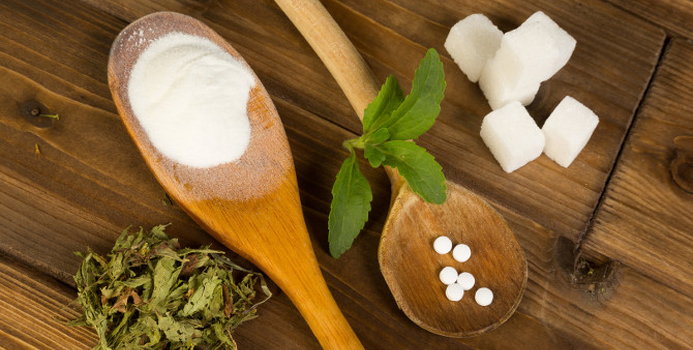Stevia vs. Splenda: Which Is Healthier?
Erin Coleman
Nutrition
Healthy Eating
Calorie-free artificial sweeteners stevia and Splenda, also known as sucralose, have quite a few things in common. While there may be some benefits from using these products, potential drawbacks exist for each as well. Choosing one type of artificial sweetener over another is often a matter of preference.
What is Splenda?
Splenda (sucralose) is approved for consumption by the
U.S. Food and Drug Administration (FDA) and is 600 times sweeter than sugar, notes
MedlinePlus. The
American Pregnancy Association reports that calorie-free Splenda is made from sugar but doesn't affect blood sugar levels, and is safe for pregnant and nursing women. The FDA notes that Splenda is heat stable, and is a useful sugar substitute for high-heat baking. Splenda is often used in baked goods, diet drinks, sugar-free gums, gelatins, and frozen dairy desserts.
What is Stevia?
Stevia -- found in Truvia, PureVia, and Enliten -- is a plant-based sweetener made from leaves of Stevia rebaudiana plants. Stevia is 200 to 400 times sweeter than sugar, notes the FDA. The FDA also reports that high-purity stevia-derived sweeteners are generally recognized as safe, but crude stevia extracts are not classified safe stevia products. The American Pregnancy Association notes that stevia in the form of rebaudioside A is generally safe for pregnant women. Like Splenda, stevia is calorie-free and is commonly found in diet drinks.
Potential Drawbacks
While both high-purity stevia sweeteners and Splenda are classified as generally safe in the U.S., potential drawbacks exist for each. A review published in 2011 in the
Journal of Pharmacology and Pharmacotherapeutics reports that sucralose, or Splenda, is an organic chloride (which could be toxic under certain conditions), and stevia fed in high doses to rats reduced sperm production. Artificial sweeteners, which include stevia and Splenda, may also be associated with weight gain, type 2 diabetes, and heart disease, according to a review published in 2013 in
Trends in Endocrinology and Metabolism.
Which is Better?
While stevia and Splenda are both calorie-free, don't increase blood sugar levels, and generally recognized as safe when consumed in moderation, they both come with potential drawbacks. Splenda may be the better choice for high-temperature baking, but both artificial sweeteners pose a risk for weight gain and unknown long-term effects.

www.fitday.com

 www.webmd.com
www.webmd.com


